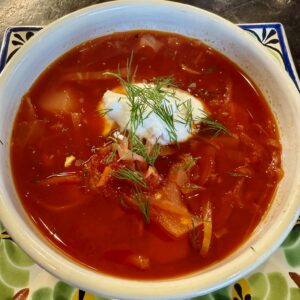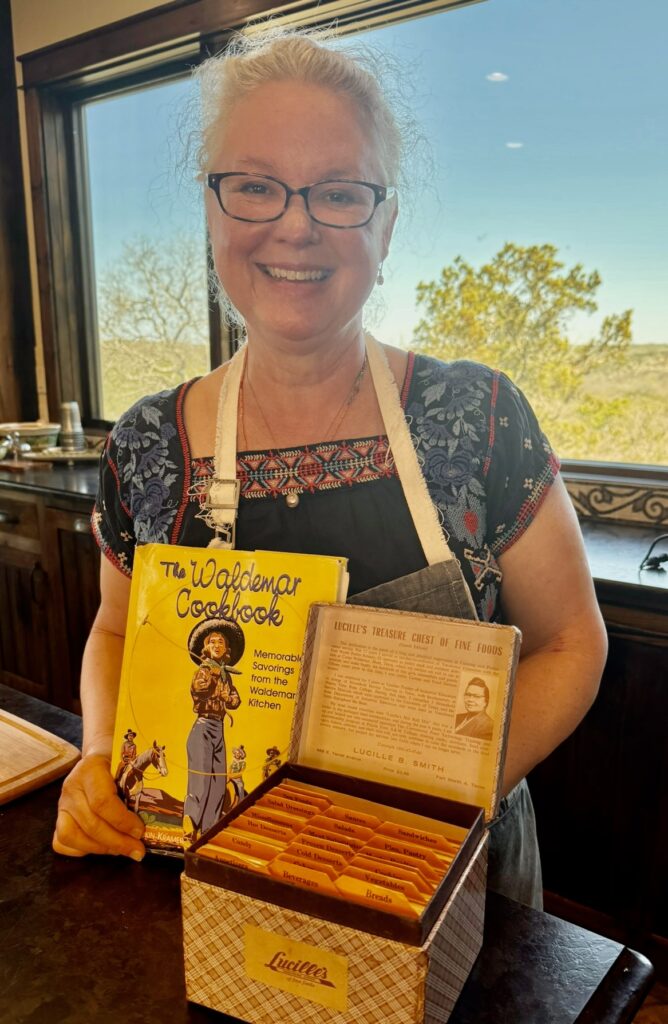Camp Waldemar
100 Years of Cherished Memories
Nestled among age-old cypress and oaks along the meandering North Fork of the Guadalupe River lies iconic Camp Waldemar – pouring forth life experiences, cherished friends, and memories to last a lifetime for girls over the past 100 years.
To learn more about Camp Waldemar, I had the wonderful privilege to share kitchen time and a couple of recipes revered by the campers with former Waldemar Executive Chef, Laura Pipkin.
A little about Laura:
Laura was a “Waldemar Girl” as a camper for four summers during her high school years. She later became the Executive Chef at Waldemar, sharing her love of exploring new recipes and techniques with the campers for 8 ½ years.
Taking this experience to another level, Laura wrote and published, The Waldemar Cookbook: Memorable Savorings from the Waldemar Kitchen
(cookbook is available on Amazon). The dedication in her cookbook describes the importance of the dinner table at the camp:
“One important constant that has persisted through all these years is an absolute dedication to delicious food. Serving over 1000 people each summer, Waldemar has always settled for nothing less than the best. The tradition of simple, timeless classics nourishing our bodies, the routine of daily exercise and the spiritual support of love and God’s beauty in every word and breath – these are the essence of the success of Waldemar.”
Laura Shares a bit of Camp Waldemar History:
“Camp Waldemar opened in 1926, founded by Ora Johnson, a woman ahead of her time in a time of women’s liberation, Ora Johnson had risen to the uppermost level of leadership of education available to women in San Antonio, Texas. Frustrated by the limitations of the era, she, with the support of her family, leased land along the beautiful Guadalupe River in the Texas Hill Country. Her vision was to create a place where girls could explore and nurture their full potential, learning to do all the things that had previously only been available to boys while still learning to be proper ladies.
Girls could learn to paddle a canoe, ride a horse, shoot a rifle, shoot archery, fence, as well as ballroom dance, make pottery and sing in choral compositions. Competition was part of the formula, learning to be gracious winners and graceful losers, doing one’s best at all times and working as a team to achieve excellence.
Aunt Ora hired the talented culinary team of Lucille Bishop Smith and her husband, US Smith, to create a culinary program that matched this same excellence. Ora sought to create a program that offered the girls a place to stretch their appetite and fill it with delicious, nutritious food. A side note about Lucille; she is considered one of the 100 most influential women in the State of Texas. Her great-grandsons opened a restaurant in Houston as an homage to her and it’s called Lucille’s.
The same mission is still in effect today, 100 summers later. Meals are still served family style with table manners, conversational skills and gratitude complemented by menus that gently stretch the girls expectations. Everyone is expected to have 3 bites of everything. Many women return years after their camping days to share that they believe they learned to eat, and to truly appreciate a meal prepared with love and gratitude at Camp Waldemar.”
Ukrainian Borscht
Laura chose two recipes that represented this ideology: Ukrainian Borscht was served on international food night. Many of the girls had never tried Borscht, but upon tasting, found that they really liked it!
This recipe comes by way of several college students from Ukraine making soup the way their family made it for the campers at Camp Waldemar. It is an amalgamation of numerous family recipes to be made with love and gratitude for the opportunity to share a hearty dish that spans many generations of community sharing a meal around the table. Serves 4 – 6.

Ukrainian Borscht
Ingredients
- 1 1 pound pork tenderloin Cut into cubes
- 4 - 6 culinary juniper berries
- 2 bay leaves
- 10 cups water
- 1 small white onion finely chopped or pulse chopped in food processor
- 1 medium carrot peeled and grated
- 3 medium red beets scrubbed and peeled
- 2 tbsp tomato paste
- 2 tbsp red wine vinegar
- 1 tsp sugar
- 3 medium potatoes peeled and cut into 1" slices
- 1/4 head green cabbage shredded
- 2-4 garlic cloves
- fresh dill leaves removed from the stem and coarsely chopped for garnish
- sour cream for garnish
Instructions
- Add the cubed meat into a large soup pot and cover with 10 cups cold water.
- Over a medium heat, gently bring the water to a simmer and skim meat foam as soon as it begins to form. Carefully skimming the foam keeps the broth clear and is an important step. Let cook for about 45 minutes. Add in bay leaves and juniper berries. Continue to cook for about 2 hours total, or until meat is tender and broth is flavorful
- Meanwhile, sauté onions with salt in a skillet until translucent and fragrant. Set onions aside.
- In the same skillet, sauté the grated carrots with salt in skillet and set aside.
- Sauté beets in the skillet until they begin to soften. Stir in red wine vinegar and salt, tomato paste and a little sugar until evenly combined. Set aside.
- Crush whole peeled tomatoes with your hands.
- Once meat is tender, add in the chopped potatoes, sautéed veggies, tomatoes, shredded cabbage and continue to cook until potatoes are tender and flavors are married. Adjust flavor with salt and pepper.
- Grate 2-4 cloves fresh garlic using zester into soup. Add more red wine vinegar if desired.
- Serve and garnish with sour cream and fresh dill.
- The soup can be stored in the refrigerator for several days or frozen for up to 2 months.
Video

